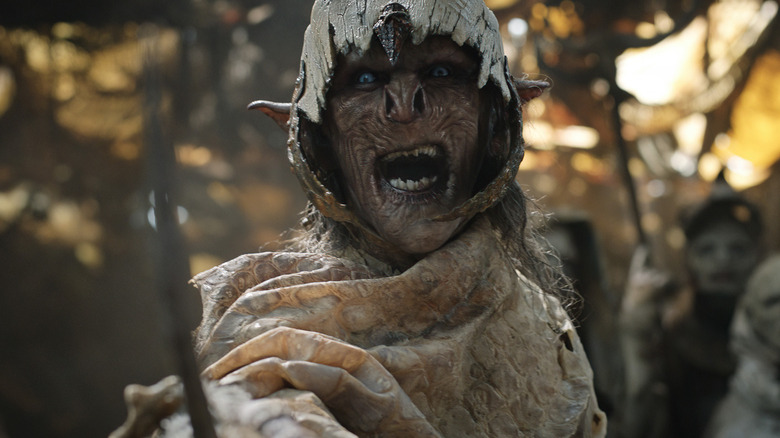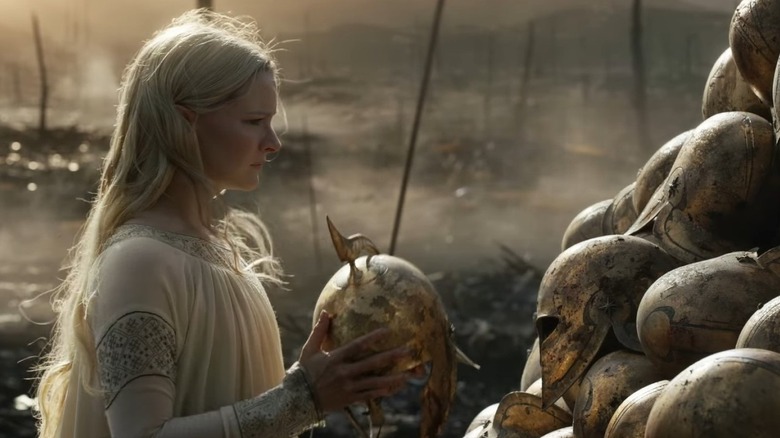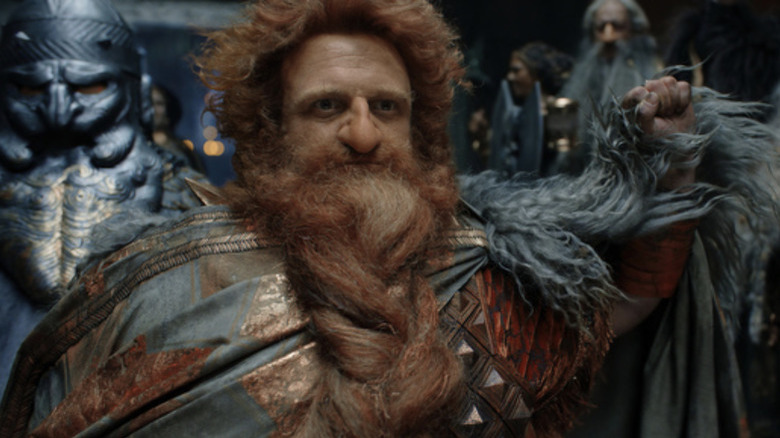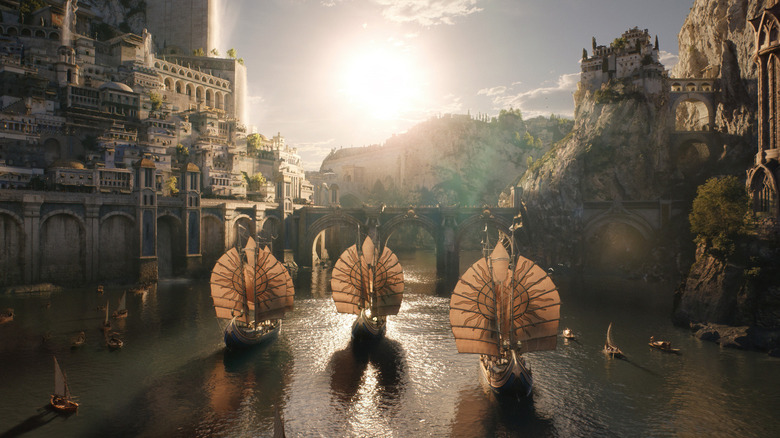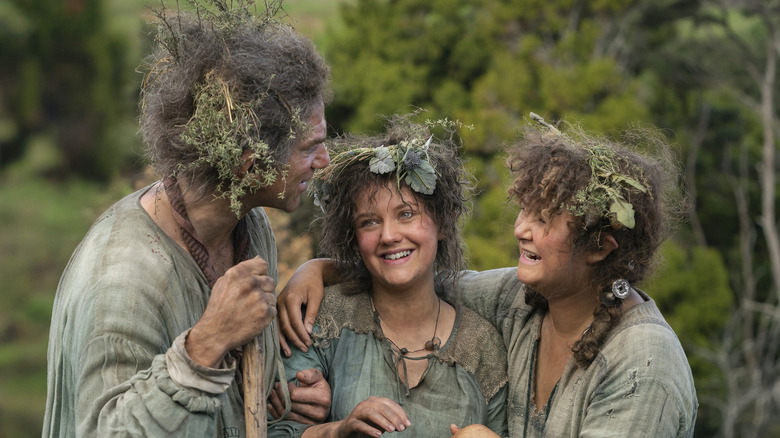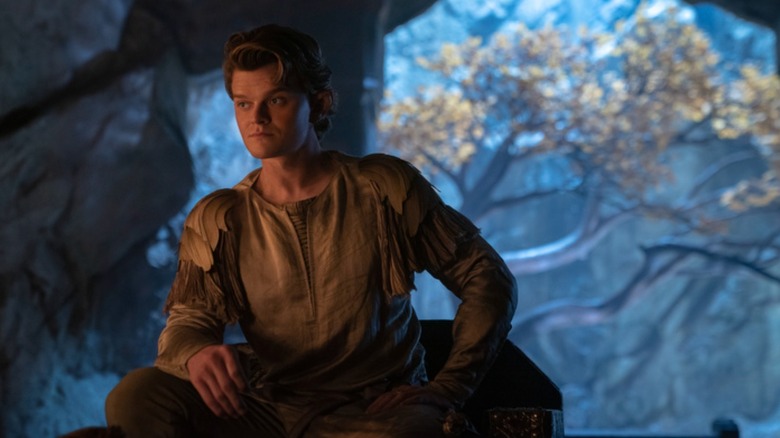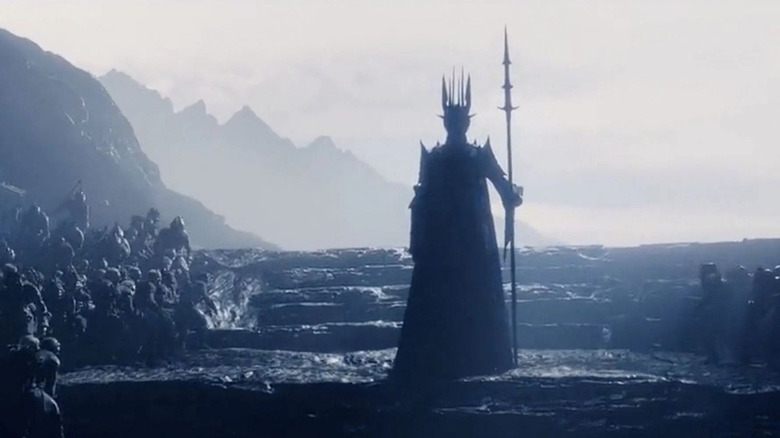The Lord Of The Rings: The Rings Of Power's Bear McCreary On The Power Of Black Speech, Crafting A New Sound For Middle-Earth [Exclusive Interview]
We're living in a golden age of fantasy, with "The Lord of the Rings: The Rings of Power" and "House of the Dragon" showing us vastly different yet equally exciting worlds (and "Willow" following close behind). "The Rings of Power" especially is a real gift, a show that manages the impossible by turning J.R.R. Tolkien's massive legendarium into a cohesive story of corruption and grief in a world before it became tainted by war.
"The Rings of Power" features gorgeous production design, a phenomenal cast, a great adaptation of the lore and mythos, and also a spectacular soundtrack that creates both a direct line of connection between the show and the Peter Jackson movies so they feel part of the same story. But it's also different enough to make it clear this is a very different age.
Composer Bear McCreary has already given us fantastic scores in major franchises, like "Godzilla," "Battlestar Galactica," and more, but his score for "The Rings of Power" is on another level. /Film spoke with McCreary about crafting a new sound for Middle-earth, how Black Speech makes everything more intimidating, thinking of future seasons, and more.
'I am thinking about essentially 50 hours'
What was your reaction upon getting the job? And what was your first thought regarding your goal for the sound of the show?
When I came on board, I think I brought with me all the years of being a huge fan of the writings of Tolkien, [as well as] the film adaptations. In many ways that had to color my experience, but I also really needed to score the story at hand and tell the story of these characters and these places. So I tried to balance that, my desire to create something new, and also to write something that could live alongside all this music that was been rolling around inside my head as a fan for my entire life.
The show is already renewed for season 2, how much of the overall story did you know in advance when crafting the score?
I knew a lot because I sat down with the showrunners and I read all the scripts and spoke with them about not only the episodes we're working on, but the entire series, what the vision is for where the entire show is going to go. So while I initially have been tasked with scoring eight hours of drama. I am thinking about essentially 50 hours. How are these themes that I might write going to evolve over that long run?
And in some cases it's a little early to get into detailed conversations about that. In other cases, it's not. When I'm thinking about themes for Elrond, Elendil, Isildur, these are characters that I think all fans have an idea where they're going to go. So I wanted to write a theme for them, and Sauron as well. Galadriel as well, that could evolve in ways that we all as fans want it to evolve.
That was a challenge, but it was also really fun because I was able to work with this huge expansive canvas, the likes of which come across in a composer's career very rarely.
'I feel like deep down inside, I think I am one of the dwarves'
What was the first track or sound that you made once you came on board the show?
I came up with a list of about 15 themes that I needed to write for the first season. It ended up being, I think, even a couple more than that. But I wanted to write in an order that made the most sense to me. I wanted to start easy. Why start with something that was too challenging? What theme would be the easiest for me to wrap my head around? And really, it was the theme for the dwarves in Khazad-dûm. I feel like deep down inside, I think I am one of the dwarves. If I related to any of those cultures, I'm a dwarf deep down inside.
And I imagined this churning, mechanical string pattern, and I imagined musicians with anvils clanging them with metal hammers. Then I imagined a choir singing in Khuzdul, a patriotic rousing text. And I knocked that out. And truly the first draft is almost identical to what you heard in episode two.
That was one of those things that did come very naturally to me. I don't know why, it's just the way my brain is wired.
On the opposite end, what was the theme you wanted to leave for last?
I think it was Elrond that was the most challenging. Interestingly, it was my fandom of the Peter Jackson films that made it more of a struggle to write a theme for Elrond. Before I took on this show, I think of Elrond, not only with Hugo Weaving's depiction from the Peter Jackson films, but even from the way he's written in the original books, as this incredible authority figure. He's so wise and ancient. He is not to be messed with. He is stern and clear.
And we meet him in "The Rings of Power," where he's an optimist, an idealist, a politician, a diplomat. In a way, he's sort of an orphan. He is not the defining authority figure of Lindon, obviously not. He's underneath Gil-galad, he's working with Celebrimbor. He's very much on his way up through the ranks. And his father and his brother are these incredibly accomplished mythic figures. And he does not have these accomplishments under his belt. What's that like?
So in a way, I had to let all that other stuff go and focus on who he is in the beginning of the story of "Rings of Power" and create something that was a little more idealistic, and optimistic, and youthful, but a melody that turned around on itself. And it moves from major to minor in such a way that it itself is a little lost. It's looking for its place.
And I'm excited to expand upon that theme over the course of the show, as he inevitably rises through those ranks to become more of an authority figure for the elves.
But it wasn't easy. It definitely took me a minute and a few tries, and JD Payne and Patrick McKay were super helpful in guiding me along those narrative shifts.
'I'm creating something that is new to fans that have been watching adaptations of Tolkien'
One cool thing about the show is that were seeing places we've never seen on the screen before, like Númenor and Valinor. What inspired you in making the sound of those places?
I was really excited at the possibility of exploring familiar sounds, first of all, that we associate with the Peter Jackson films and Howard Shore's writing. I did not want to unpleasantly surprise anybody. I thought ethereal light vocals for the elves, and deep male vocals for the dwarves, and a subtly Celtic influence for the Harfoots who would become our hobbits. So those were givens.
It was really interesting though, working with colors that are new, in particular Númenor, where there really wasn't a sound, and there hasn't really been a sound associated with Númenor. So I was inspired to give Númenor a color that would be different than anything else we'd heard in any Tolkien adaptations in a prominent way.
So I featured a lot of Middle Eastern and Mediterranean colors. There's an Armenian woodwind instrument called a Duduk that combines with a Turkish string instrument called a tambur. By using these sounds, I'm creating something that is new to fans that have been watching adaptations of Tolkien. And I wanted that feeling when we pull into Númenor of hearing something that is different, that has its own identity because the high men of Númenor and the low men of the Southlands are meant to be very different.
Bringing a bit of the real world into Middle-earth
One thing I love about Howard Shore's score is how he used instruments with a long history. I'm curious if that's something you brought over to the show.
I always love to use exciting colors from cultural music from around the world in my scores. And indeed, if one were to listen to my work on "Battlestar Galactica" or "Godzilla: King of the Monsters" or "Outlander" or "God of War," you would hear all kinds of different colors. So this is something I have been researching my entire career. And that research was incredibly helpful in doing "The Lord of the Rings, The Rings of Power."
Some of these colors are continuous with what Howard Shore did in the films. In the films, when we meet Rohan, the riders of Rohan and that sort of nation, it's associated with a hardanger fiddle, a Nordic instrument called the hardanger fiddle in those scores.
Sure enough, in "The Rings of Power," I'm using a hardanger fiddle in combination with another Nordic instrument called a nyckelharpa to represent the southlands, the low men, the men who are not descended from Numenorian ancestry.
So in that way, I'm trying to create something continuous with what Howard Shore did. Howard had a Celtic influence to the Shire and to the hobbits that he really filtered through a British folk music lens. I would not describe the Shire theme as particularly Celtic. It's really more like British. It feels like British folk music with a little Celtic whistle now and again.
But I leaned into that color, the Celtic side, much more. I'm using Uilleann pipes from Ireland, small Scottish bagpipes from Scotland, a Bodhran, which is a frame drum used in Irish music that has this vocal pitch bendy quality, and Irish penny whistles and tin whistles. It's almost as if to imply that there's a more portable, more Celtic, more earthy Celtic color for the Harfoots that will settle down into a more British folk music color thousands of years from now in the Shire.
So they're not the same. They are different, but they're continuous. And I loved the idea of being able to use those colors to tell that story.
'My biggest hope is that it feels right'
What is one element from Howard Shore's score you wanted to keep for the show, and one that you specifically wanted to stray away from or do differently to make clear this is a different story?
I think the thing I wanted to preserve was a sense of continuity. I wanted fans who love the Peter Jackson films, fans like myself, to listen to the music of Khazad-dum, the music of Lindon, the music of Sauron, and to nod their head and say, "Yes, yes, that is correct. That is what I want that to sound like." And that's not even a very specific element. It's a general mood, a general sense of connection that is built from an indescribable number of very specific little musical decisions, ingredients in the cake that are similar.
In terms of setting it apart, I want themes that represent our characters as they exist now. I already discussed Elrond as an idealist and a diplomat and a bit of an orphan. Galadriel is driven by a sense of justice, if not a sense of revenge. She is not the calm, wise character she will become. So I wanted to write a theme that had an evocative melody, but really also has a sense of urgency, and drive, and motivation so that we can feel her evolve over the course of our show.
I think the things that are different are very obvious. I mean, it's the Numenor theme, inevitably it's different. I am not able to write in someone else's language. It is my language. So it's inevitable that it would be different. My biggest hope is that it feels right, and that people fall in love with this depiction of Middle-earth, and that the music is one of the many reasons they go on the journey.
'There was a sense of ominous evil that came out of those words'
Something I love about the show is the inclusion of choirs in different languages. Can you talk about including dwarvish, two elvish languages, and bringing it together for the music of the show?
Yeah, it's pretty exciting to be able to work with the different languages that Tolkien devised for his legendarium. I felt that the score would not be complete if those languages were not integrated into the score. So I worked closely with JD Payne, one of the writers and showrunners, and Leif McPherson, our dialect coach, to make sure that every cue that has choir and features text that is sung in an appropriate language saying an appropriate idea. And Leif created pronunciation guides. She would very slowly and articulately record every syllable so the choir could listen while they were recording, and before they rehearsed they would get all the pronunciation correct. And it was fascinating, the emotional impact that had, because Tolkien was really clever about how he devised his languages. Black Speech has a lot of consonants, has a lot of percussion built into the way it is even said.
So to even say it correctly made it scarier. There's a cue in the second episode where Bronwyn is running into the town to warn everyone that something terrible is coming. And I wrote the quotation of the Sauron theme there because there's a threat. There's something evil coming. And when I heard the recording, it was 10 times more aggressive and scary than I thought it was going to be. And I chimed into the conductor and I said, "What's happening with the dynamic here? It's not meant to be super loud."And then I realized it was the pronunciation, it's the word itself. And I thought about how in the books and in the movies to speak Black Speech causes the world around you to turn dark. An evil presence happened. And sure enough, that happened in the recording. There was a sense of ominous evil that came out of those words just because you must pronounce the consonants in a very specific way.
That was fascinating. I feel like that was Tolkien's values and language influencing the score in a very unique and the specific way. And I thought it was just a wonderful opportunity as a composer to get to work with those languages.
"The Lord of the Rings: The Rings of Power" is streaming on Prime Video.
